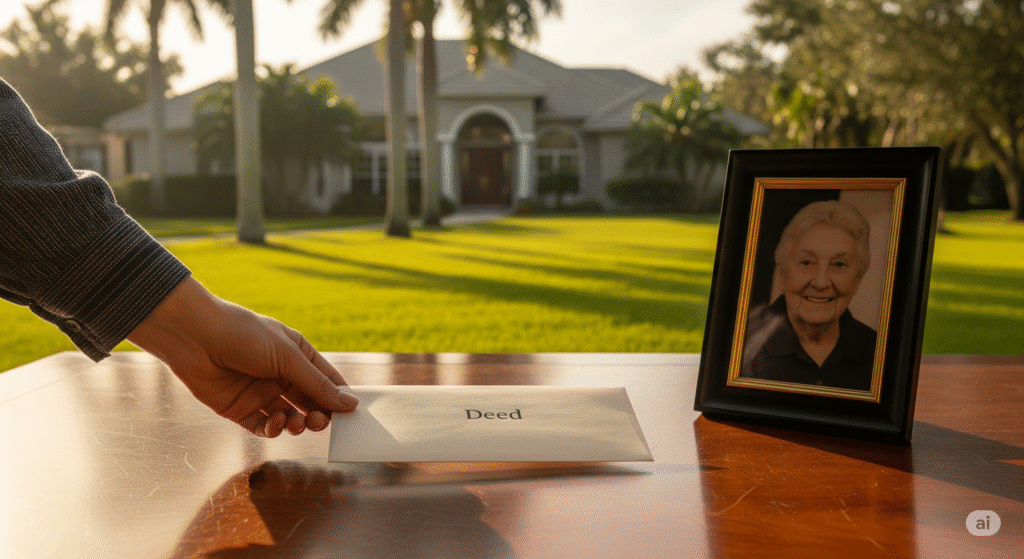When a property owner passes away in Florida and a Lady Bird Deed (also called an enhanced life estate deed) is in place, the next steps are often much simpler than many people expect. This type of deed is specifically designed to avoid probate, but it still requires a few important actions to officially transfer the property.
If you’re wondering what to do with lady bird deed after death, here’s a step-by-step guide to help you complete the process properly.

For an overview of how this tool works, you can also visit our main Lady Bird Deed page.
Need help now? Call (954) 355-4255 or return to our homepage to explore all our legal services.
Step 1: Verify That the Property Was Transferred with a Lady Bird Deed
Before taking any action, confirm that the deed on the property is in fact a Lady Bird Deed. You can usually find this information in the recorded deed document, which should include:
- The name of the current owner (who has passed away)
- The phrase “enhanced life estate” or language indicating the owner kept full control during life
- The names of the remainder beneficiaries (often listed as “remaindermen”)
If you’re not sure what type of deed is in place, our attorneys at Woodstock Law Firm can help you review the document and explain your options.
Step 2: Obtain a Certified Copy of the Death Certificate
You will need a certified copy of the deceased owner’s death certificate to begin the transfer process. This document proves that the life estate has ended and that the property should now pass to the named beneficiaries.
You can request the death certificate from the Florida Department of Health or the county health department where the person died.
Step 3: Record the Death Certificate with the County Clerk
Once you have the certified death certificate, it must be recorded with the Clerk of Court in the county where the property is located. This step officially updates the public records to show that the property is now owned by the remainder beneficiaries.
What you’ll need:
- Certified copy of the death certificate
- Property information (legal description, address)
- Small recording fee (varies by county)
Recording the death certificate is a critical step to ensure that the transfer is recognized by the county and by title companies.
Step 4: Notify the Property Appraiser’s Office
After recording the death certificate, you should contact the local property appraiser’s office to update the ownership records and confirm whether the property still qualifies for the Florida homestead exemption.
In some cases, you may need to reapply for the exemption if the new owner plans to use the property as their primary residence.
Step 5: Understand Your Rights as the New Property Owner
Once the property has officially transferred, the named beneficiary becomes the full legal owner. You now have the right to:
- Sell the property
- Refinance the mortgage
- Rent it out or occupy it
- Transfer it to someone else
There is no need for probate, no court hearing, and no additional approval needed—as long as the Lady Bird Deed was valid and properly recorded.
Do You Need a Lawyer After the Owner’s Death?
In many cases, you can complete the steps above without going to court. However, it’s a good idea to consult an attorney if:
- The deed has unclear or conflicting language
- There are multiple beneficiaries and disagreement among them
- There are outstanding liens, judgments, or unpaid taxes
- You cannot locate the original deed or legal description
- You plan to sell or transfer the property and want to avoid title issues
At Woodstock Law Firm, we assist families across Florida with Lady Bird Deed transfers, ensuring all documents are correct and the process is smooth from start to finish.
Need Help Completing a Lady Bird Deed Transfer?
If you’re not sure what to do with lady bird deed after death, we’re here to help.
Our attorneys can:
- Review the deed
- Confirm your rights as a beneficiary
- Record the necessary documents
- Assist with title updates and property transfers
Call us today at (954) 355-4255 or request a free consultation online.
We serve clients throughout Florida and offer fast, flat-fee service.
Se habla español.
